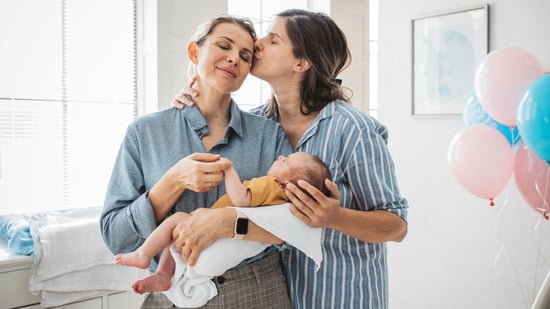How Long Should I Wait After IVF Before Trying to Conceive Again?
July 13th, 2024 | 6 min. read

Ask Monica is a Q&A video series hosted by Nurse Practitioner Monica Moore.
In this article:
Trying to Conceive After IVF Success
One of the most common questions we hear from patients is, “How long should I wait after delivery before trying to conceive my next baby?” In this video, Monica explores the answer for fertility patients eager to grow their family after a successful IVF cycle.
Monica Moore:
Hi, everyone. Today, on this edition of Ask Monica, we're going to talk about how long after having a baby you can safely do another embryo transfer. This is a common question that we get - and a good one.
Those of us in reproductive medicine know that many of our patients start off having their first baby a little bit older than most people. We also know that it might take you longer to conceive than someone who hasn't experienced infertility.
So it makes sense that after a potentially long, complicated fertility journey, new parents are anxious to get the ball rolling on their next cycle. If you plan on having more than one child (and may need to undergo additional egg retrievals or work with a donor), it's important to discuss this with your doctor so they can work to help you achieve that goal.
How long should I wait before doing another embryo transfer?
Currently, our governing organization, the American Society of Reproductive Medicine (ASRM) doesn't really have guidelines on this. However, the American College of Obstetricians and Gynecologists (ACOG) does:
ACOG's official recommendation is to wait at least six months (but preferably up to 18 months) after delivering your baby before getting pregnant again. Read more here.
C-section vs. Vaginal Delivery
At Illume Fertility, our recommendation is this:
- If you had a vaginal delivery, we would like you to wait at least nine months prior to doing another embryo transfer cycle.
- If you delivered via C-section, we want you to wait at least one year.
Why do I have to wait longer after a C-section?
Having another baby too quickly after a C-section can put you at risk for serious complications, such as uterine rupture and other issues with the uterus (due to having a pretty profound/intense uterine surgery during your C-section).
In short, your body, and particularly your uterus, needs more time to recover after a C-section than it would with a vaginal delivery.
Why should I wait to TTC again?
While it can be frustrating to hear all of this information, it's crucial to understand the importance of allowing your body to heal before starting another pregnancy journey. Here are some additional considerations and safety concerns:
Postpartum Recovery
Pregnancy and childbirth are major events that take a toll on your body. When you try to conceive too quickly after giving birth, you're not only putting your own body, but your future baby, at risk of some serious complications.
Optimizing Your Health
Another reason to wait longer is that your body needs to rebuild your vitamin stores after being depleted during pregnancy. Start folic acid or prenatal vitamins, if you haven't already.
As always, we feel like pre-pregnancy is a great time to try to optimize your health. So if you have any conditions like pre-diabetes, high blood pressure, thyroid issues, anything like that, we want you to be working with a medical professional to manage them.
Medication Changes
Your hormones also fluctuate drastically during the pregnancy and postpartum period. Your brain needs some time to "reset" after this life-changing experience.
It's important to note that a lot of antidepressants and anti-anxiety medications may need to be switched to a safer medication for pregnancy. Always discuss all prescriptions and supplements you're taking with your reproductive endocrinologist, and work with your psychiatrist to find the right solutions.
Questions to ask your provider:
- Are there any medications that I would be able to wean off of?
- Should I switch any of my medications to others that are safer during pregnancy?
Diet & Lifestyle
If your body mass index (BMI) is either too low or too high, according to the BMI chart (which is not perfect or ideal, it's just the standard) right now is an ideal time to work with someone (or on your own) to establish a regular movement practice.
Try to move your body and eat in a healthy, sustainable way so that your BMI can comfortably settle, wherever your weight "set point" is going to end up being.
What if I want to conceive before 6 months?
Waiting six to 18 months post-delivery before trying to conceive again is the recommendation from ACOG, and most fertility centers follow these guidelines. But, like I said, we know that the people that come to see us are a little bit more anxious about starting sooner rather than later, so we do try to take that into account.
However, even if you want to start trying to conceive or have an embryo transfer prior to reaching six months postpartum, it's highly unlikely we would want you to do that, for your own safety.
Thanks so much. Continue to always email or send in your questions for this Ask Monica series. Happy to answer them, and good luck with your fertility journey!
Have a question about fertility?
Submit it here and we'll answer it in a future episode of Ask Monica!
Monica Moore is a board-certified Advanced Practice Nurse Practitioner, nurse educator and health coach who has been caring for patients at Illume Fertility for over 20 years. She is also the founder and lead educator at Fertile Health, LLC. Monica is passionate about taking care of the whole patient, believing in the importance of integrating comprehensive care. She has a special interest in PCOS and combating weight bias with education and advocacy.
